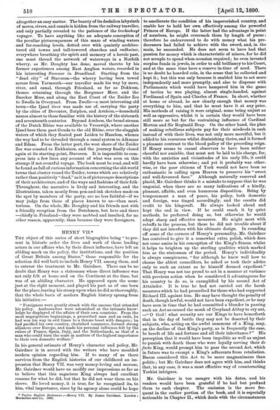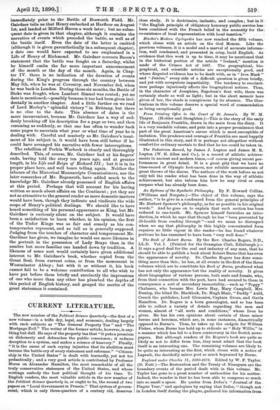HENRY VII.* THE object of this series of short biographies
being "to pre- sent in historic order the lives and work of those leading actors in our affairs who, by their direct influence, have left an abiding mark on the policy, the institutions, and the position of Great Britain among States," those responsible for the selection did well both to include Henry VII. among them, and to entrust the treatment to Mr. Gairdner. There can be no doubt that Henry was a statesman whose direct influence was not only felt at home and on the Continent at the time, but was of an abiding character. He appeared upon the scene just at the right moment, and played his part as of one born for the place, leaving his stamp upon what he did so thoroughly, that the whole basis of modern English history sprang from his initiative :—
" Foreigners were greatly struck with the success that attended his policy. Ambassadors were astonished at the intimate know- ledge he displayed of the affairs of their own countries. From the most unpropitious beginnings, a proscribed man and an exile, he had won his way in evil times to a throne beset with dangers ; he had pacified his own country, cherished commerce, formed strong alliances over Europe, and made his personal influence felt by the rulers of France, Spain, Italy, and the Netherlands, as that of a man who could turn the scale in matters of the highest importance to their own domestic welfare."
In his general estimate of Henry's character and policy, Mr. Gairdner is in accord with the writers who have moulded modem opinion regarding him. If to many of is there survives from the English histories of our childhood an im- pression that Henry VII. was very money-loving and morose, Mr. Gairdner would have us modify our impressions so far as to believe that this sagacious King always had excellent reasons for what he did, but that he did not wear them on his sleeve. He loved money, it is true, for he recognised its, to him, vital importance, since by its agency alone could he hope
• Twelve English, Statesmen :—Henry VII. By James Gairdner. London : Macmillan and Co. 1889.
to ameliorate the condition of his impoverished country, and enable her to hold her own effectively among the powerful Princes of Europe. If the latter had the advantage in point of numbers, he might overreach them by length of purse : therefore he endeavoured to do with money what his pre- decessors had failed to achieve with the sword, and, in the main, he succeeded. He does not seem to have had that passion for money which is characteristic of misers, for he did not scruple to spend when occasion required; he even invested surplus funds in jewels, in order to add brilliancy to his Court, and at the same time have a reserve in-time of need. There is no doubt he hoarded coin, in the sense that he collected and kept it ; but this was only because it enabled him to act more independently and more promptly, and also to dispense with Parliaments which would have hampered him in the game of tactics he was playing, almost single-handed, against Ferdinand of Spain and Charles of France. In short, whether at home or abroad, he saw clearly enough that money was everything to him, and that he must have it at any price. His methods of raising it were original, some being unjust as well as oppressive, whilst it is certain they would have been still more so but for the restraining influence of Cardinal Morton and Sir Reginald Bray. On the other hand, the plan of making rebellious subjects pay for their misdeeds in cash instead of with their lives, was not only more merciful, but it added to his resources whilst diminishing theirs, and it formed a pleasant contrast to the blood policy of the preceding reign. If Henry seems to casual observers to have been neither cheerful nor amiable, that must not be laid to his charge, for, with the anxieties and vicissitudes of his early life, it could hardly have been otherwise ; and yet it probably was other- wise, or the poor citizens of York would not have been so enthusiastic in calling upon Heaven to preserve his "sweet and well-favoured face." Although naturally reserved and placid, Mr. Gairdner thinks it a mistake to suppose that he was ungenial, when there are so many indications of a kindly, pleasant, affable, and even humorous disposition. Being by temperament a man of peace, his policy, both domestic and foreign, was tinged accordingly, and the results did credit to his kingcraft. He always looked ahead and kept the end in view. If he could reach it by quiet methods, he preferred doing so, but otherwise he would adopt sharp and effective measures. He might meet with rebuffs in the process, but these he did not trouble about if they did not interfere with his ultimate design. In rounding off some of the corners of Henry's personality, Mr. Gairdner has contrived to give it a somewhat extra polish, which does not come amiss in his conception of the King's fitness, whilst it helps to brighten up the sterling qualities which marked him as the statesman of the period. Henry's individuality is always conspicuous, "for although he knew well how to choose the ablest councillors, he asked or took their advice only to such an extent as he himself deemed expedient." That Henry was not too proud to set in a manner at variance with previous action when he considered it advantageous for his country to do so, is exemplified by his second Act of Attainder. It is true he had not carried out the harsh measures which be had prescribed for those who had supported Richard III. against him. He may have thought the penalty of death, though lawful, would not have been expedient, or he may have seen in time that he had committed a blunder in passing such an Act as caused the monk of Croyland Abbey to cry out, —" 0 God ! what security are our Kings to have henceforth that in the day of battle they may not be deserted by their subjects, who, acting on the awful summons of a King, may, on the decline of that King's party, as is frequently the case, be bereft of life and fortune and all their inheritance P" His perception that it would have been impolitic as well as unjust to punish with death those who were loyally serving their de facto King, would prompt him to pass the second Act, which in future was to exempt a King's adherents from retaliation. Bacon considered this Act to be more magnanimous than politic ; but Mr. Gairdner does not agree with him, and thinks that, in any case, it was a most effective way of counteracting Yorkist intrigues.
Mr. Gairdner is too meagre with his dates, and his readers would have been grateful if he had but prefixed them to each chapter. The omission is the more fre- quent in the earlier portion of the book, and it is especially noticeable in Chapter II, which deals with the circumstances immediately prior to the Battle of Bosworth Field. Mr. Gairdner tells us that Henry embarked at Harlem. on August 1st, and landed at Milford Haven a week later ; but no subse- quent date is given in that chapter, although it contains the narrative of events which preceded the battle, as well as of the battle itself. Even the date of the latter is omitted (although it is given parenthetically in a subsequent chapter), a date one would have expected to see emphasised in a Life of Henry of Richmond. Mr. Gairdner corrects Bacon's statement that the battle was fought on a Saturday, whilst he himself omits the far more important announcement of the month or the day of the month. Again, in Chap- ter IV. there is no indication of the duration of events during the King's progress through the country between May 5th, when he was at Coventry, and November 3rd, when he was back in London. During those six months, the Battle of Stoke was fought, when Lambert Simnel was routed; yet no date is mentioned,—possibly because it too had been given inci- dentally in another chapter. And a little farther on we read of Lord Morley's "splendid victory" in Brittany, but there is no clue to the date. This absence of dates is the more inconvenient, because Mr. Gairdner has a way of sud- denly breaking off his description for a page or two, and then resuming as suddenly, so that one has often to wander back some pages to ascertain what year or what time of year he is dealing with. Careful and masterly as Mr. Gairdner's treat- ment of his subject is, it would have been still better if he could have arranged his narrative with fewer interruptions.
The rebellion of Perkin Warbeck is clearly and thoroughly described. This, of course, Mr. Gairdner had at his fingers' ends, having told the story ten years ago, and at greater length, in his Life and Reign of Richard III.; but it is in its proper place here, and well bears telling again. Neither the labours of the Historical Manuscripts Commissioners, nor the later researches of Mr. Begenroth, have added much to the knowledge Mr. Gairdner already possessed of English affairs at this period. Perhaps that will account for his having written so much about affairs on the Continent ; yet they are not so attractive to the general reader as more domestic matters would have been, though they indicate and vindicate the wide scope of Henry's political dealings. We should like to have heard something of his personal appearance as King, but Mr. G-airdner is curiously silent on the subject. It would have been a satisfaction to learn whether, in his opinion, the first of the Tudor Kings was as fair and comely as his con- temporaries represent, and as tall as is generally supposed. Judging from the touches of character and temperament Mr. Gardiner has given, we imagine he would see more likeness in the portrait in the possession of Lady Braye than in the sombre but more amiliar one handed down by tradition. A likeness of some sort would certainly have given additional interest to Mr. Gairdner's book, whether copied from the Great Seal, from current coins, or from the monument in Westminster Abbey; but with it or without it, his book cannot fail to be a welcome contribution to all who wish to have put before them briefly and succinctly the impressions of one who more than any other has plumbed the depths of this period of English history, and gauged the merits of the great statesman it contained.



































 Previous page
Previous page